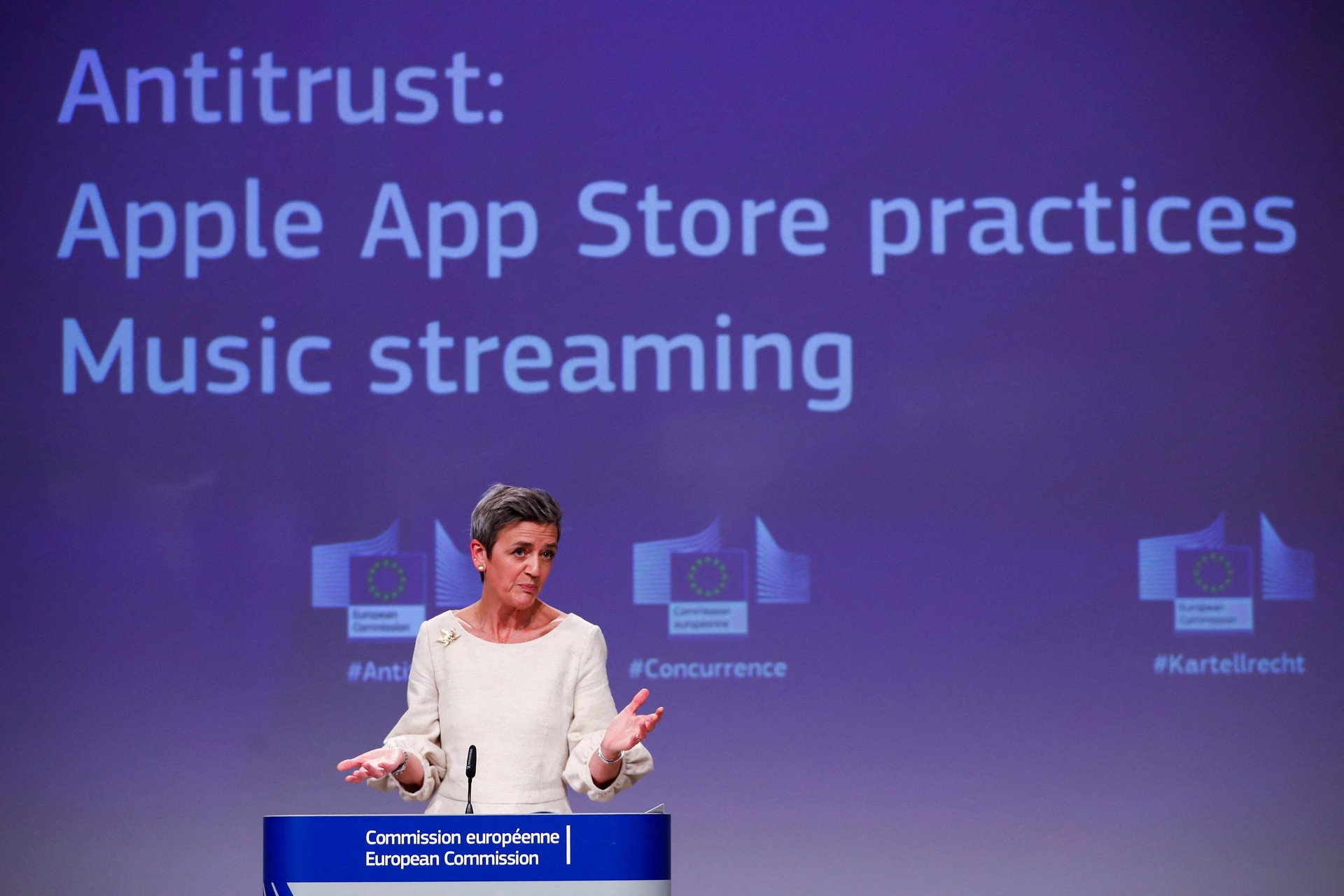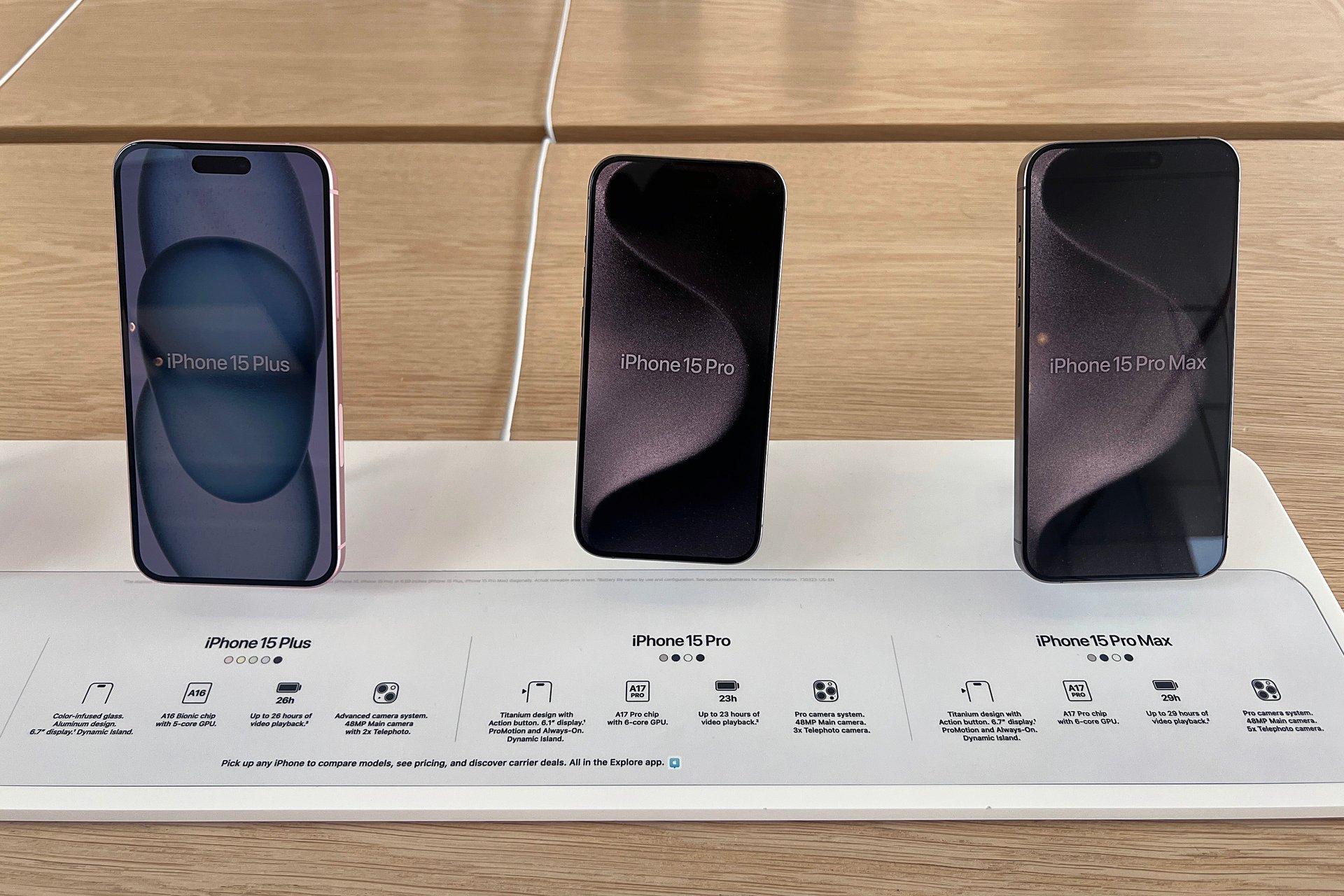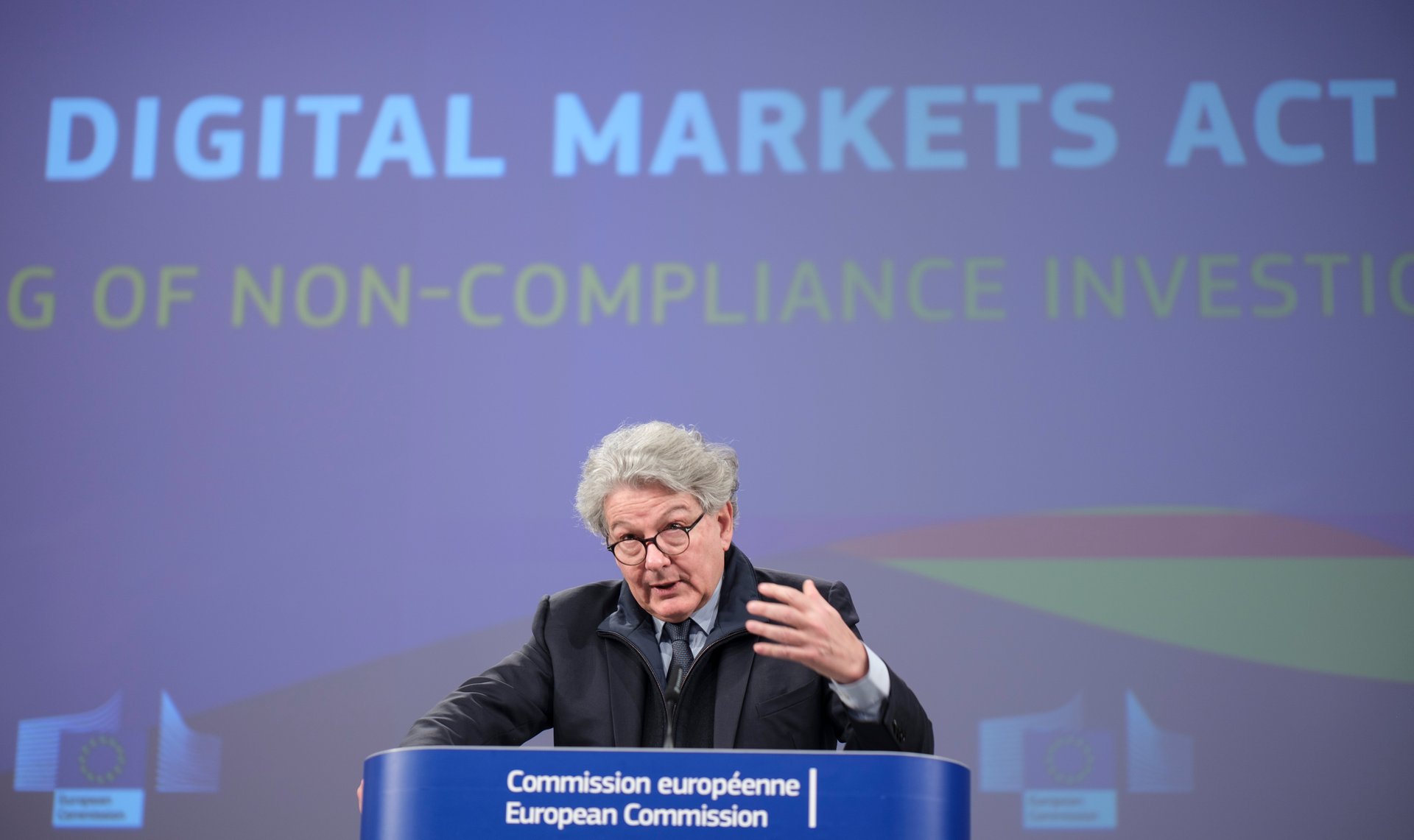A timeline of Apple's rough 2024 (so far)
Apple's market cap now trails Microsoft by the size of Tesla's after a start to the year that included a sweeping DOJ antitrust lawsuit

Apple has had a rough 2024 — and we’re only (nearly) three months in.
The Cupertino, California-based company’s stock had its biggest drop since August last Thursday, slumping more than 4% and wiping away $113 billion of the tech giant’s value. The fall came after the Department of Justice filed an antitrust lawsuit against the company. At the end of market close on Friday, Apple had won back $15 billion in market capitalization. And on Monday, Apple became one of the the first companies targeted by the European Union under a sweeping new law designed to stop big tech firms from cornering the market online.
Apple stock is now down almost 8% so far this year after a string of losses, from a failed electric vehicle project to slowed iPhone sales. Apple — once the world’s most valuable public company — is now worth $525 billion less than Microsoft, which has watched its stock jump more than 15% this year.
That leaves Apple with a nearly Tesla-sized gap in value between it and its chief rival. Elon Musk’s EV company has a $535 billion market cap.
Let’s run down Apple’s struggles in 2024 so far.
2 / 7
Titan toppled

No one really knows what Apple’s infamous “Project Titan” would have looked like before it was canceled. But this illustration from British leasing company Vanarama — tied together using “genuine patents filed by Apple” — gives a good idea of what the eventual electric car may have looked like.
The project was started roughly a decade ago and OKed by CEO Tim Cook, building on an idea Apple founder Steve Jobs had around the time that Tesla launched its first car in 2008.
However, it was doomed from the start. The tech giant has changed the project’s leadership and strategy several times over the years, and the multibillion-dollar effort has been repeatedly delayed. Most recently, in January, Apple had envisioned a 2028 launch.
Although Apple has given up — for now at least — on its auto plans, other smartphone makers are charging ahead.
Huawei, has been pushing ahead in the automotive world, developing and supplying technology critical for carmakers. Fellow Chinese smartphone giant Xiaomi will begin selling its SU7 four-door sedan in China next week; the company claims its first-ever EV will accelerate faster than Tesla’s and Porsche’s respective offerings.
3 / 7
The DOJ sues Apple

The U.S. Department of Justice (DOJ) filed a sweeping antitrust lawsuit against Apple on Thursday, accusing the iPhone maker of creating a monopoly over the smartphone market and engaging in anti-competitive practices.
The lawsuit, filed in federal court in New Jersey by the DOJ and 16 state attorneys general, claims Apple uses its control over the iPhone platform to “extract higher fees, thwart innovation,” and “throttle” competition through its App Store. It also repeats familiar claims that Apple’s so-called “walled garden” has made it more difficult for consumers to switch to competing products.
“We allege that Apple has maintained monopoly power in the smartphone market, not simply by staying ahead of the competition on the merits, but by violating federal antitrust law,” Attorney General Merrick Garland said in a statement. “If left unchallenged, Apple will only continue to strengthen its smartphone monopoly.”
Apple has refused to support limited third-party digital wallets, non-Apple smartwatches, and cross-platform messaging apps, while blocking mobile cloud streaming services and “Super Apps,” according to the DOJ’s lawsuit. The Justice Department also cited Apple’s other products and ser
vices, including its advertising, news subscription, FaceTime and CarPlay services.
Apple has since taken aim at many of the DOJ’s arguments and issued rebuttals to its claims regarding third-party developers, green-text bubbles, and claims it has a monopoly in the smartphone industry.
🎧 On our podcast episode, Superapps: There can be only one, Quartz’s Ananya Bhattacharya asks why the dream of building a superapp in the West is so persistent?
Listen on: Apple Podcasts | Spotify | Google | Stitcher
4 / 7
Europe takes on tech

On March 4, the European Commission (EC) slapped Apple with a $1.95 billion fine, accusing the company of abusing its dominant position on the market for the distribution of music streaming apps, such as Spotify or Apple Music. It marked the first fine for Apple from the Brussels-based agency, which opened an investigation into the company after a complaint from Spotify in March 2019.
“From now on, Apple will have to allow music streaming developers to communicate freely with their own users, be it within the app, or by email, or any other way of communicating,” said Margrethe Vestager, the EC executive vice president overseeing competition policy.
The ruling was met with immediate praise from companies that have criticized Apple’s walled garden; Spotify, for one, cheered the removal of Apple’s “muzzle” on it and other music streaming services.
Apple is also reportedly facing a probe from the EC over potential violations of the EU’s Digital Markets Act (DMA), a law aimed at protecting open markets. The law went into effect on March 7 and allows the Commission to fine companies as much as 10% of a company’s total annual global revenue, and up to 20% for repeat offenders.
5 / 7
Smartphone slump

Apple is going through something of a sales decline in China, despite its efforts to make its iPhone more attractive.
iPhone sales in the country fell 24% year-over-year in the first six weeks of 2024, according to Counterpoint Research. The iPhone’s declining sales were in part caused by “abnormally high” iPhone sales during the same period the previous year, driven by production issues in December 2022. The company’s newest phone, the iPhone 15, isn’t standing out to Chinese consumers, especially with increasing competition and “aggressive pricing” from local competitors like Huawei and Xiaomi.
Apple CEO Tim Cook recently visited Shanghai, China, to help advertise the opening of the company’s 47th store in the country. The executive had breakfast with Chinese actor Zheng Kai, and visited the Apple Nanjing East Road retail store, according to a post on the Chinese social media platform Weibo.
Plus, Apple has recently agreed to settle a shareholder lawsuit for $490 million over 2018 comments by Cook about sales projections for China.
6 / 7
The EU announces an investigation

The European Commission — the regulatory enforcement arm of the European Union — on March 25 announced a series of non-compliance investigations against Apple, Google parent Alphabet, and Facebook parent Meta.
The Commission said it would investigate whether the tech giants were not complying with the the Digital Markets Act (DMA) which went into effect on March 7 and requires “gatekeepers” — Amazon, Apple, Alphabet, Meta, Microsoft, and TikTok owner ByteDance — to follow a series of new rules for operating online.
The Commission is looking into whether Apple allows iPhone users to “easily” uninstall software, change settings, and change default options for search engines or browsers. Proceedings in a major antitrust lawsuit in the U.S. against Google revealed that the tech giant pays Apple billions of dollars annually to keep its search engine the default option in Apple’s safari browser.
Additionally, Apple is being probed over whether its app store allows app developers to “steer” customers to offers outside of their stores. Google is being investigated over similar concerns.
“We’re confident our plan complies with the DMA, and we’ll continue to constructively engage with the European Commission as they conduct their investigations,” Apple said in a statement, noting that it has introduced new features and tools to comply with the DMA. “At the same time, we’ve introduced protections to help reduce new risks to the privacy, quality, and security of our EU users’ experience.”
The Commission expects to conclude its inquiries within 12 months.
7 / 7
Apple’s largest layoffs since the pandemic

Apple on April 5 said it would lay off 614 employees in California, according to eight reports filed with the California Employment Development Department, in compliance with the Worker Adjustment and Retraining Notification (WARN) process.
At least 87 of the laid off employees worked in a secret Apple facility dedicated to designing and producing its own device displays. Apple began shutting down the project at around the same time it began closing down Project Titan, its planned self-driving electric vehicle. The laid off employees were notified on March 28 and will be terminated effective May 27.
The layoffs mark Apple’s largest since the pandemic. Many of the workers had been working on Project Titan in Apple’s office in Santa Clara, California.
-Britney Nguyen contributed to this article.